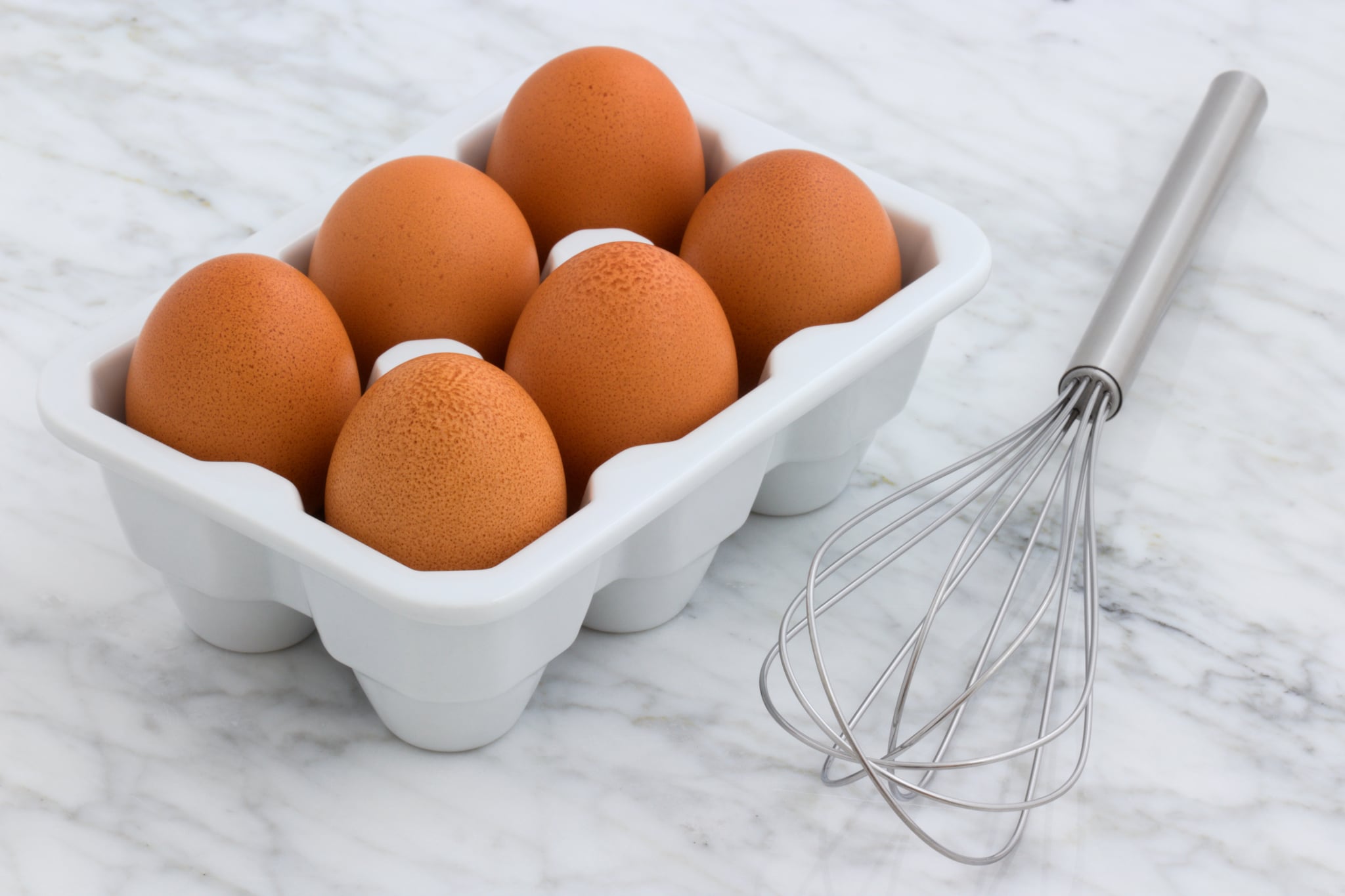
When people find out that I'm a registered dietitian-nutritionist, many assume that I love to grocery shop and cook. While I wish this was the case, it could not be further from the truth. My work is centreed on nutrition, but I am also a mom and am constantly juggling things in my life. The last thing I want to do is make frequent trips to the grocery store or spend hours in the kitchen.
My grocery list [1] may vary from week to week, but one item that always finds a place in my fridge is eggs. Brown shells, white shells, organic, or otherwise — as long as they're not cracked, those nutritious eggs [2] are coming home with me. Here's why.
1. Eggs Have a Long Shelf-Life
When you need to limit trips to the grocery store, eggs are a must — they're a high-quality protein, and they last. Raw whole eggs in their shell will keep without losing quality for up to five weeks beyond the pack date [3] if they're stored safely in the refrigerator, according to the American Egg Board.
You can also hard-boil a batch of eggs for quick grab-and-go snacks and to incorporate into meals throughout the week. Once cooked, hard-boiled eggs are safe to eat for up to a week when kept in the fridge. Once peeled, they're best eaten the same day.
If plans change and you realise you're not going to be able to plow through the eggs you've purchased within three weeks of bringing them home, you can also freeze them. Crack and beat the eggs until blended, pour them into freezer containers, seal the containers tightly, label with the number of eggs and the date, and then place them in the freezer. You can freeze them like this for up to a year. When you're ready to use them, simply defrost the eggs in the refrigerator and substitute 3 tablespoons thawed egg for 1 large fresh egg.
2. Eggs Are Nutrient Powerhouses
For just 70 calories each, eggs are a good or excellent source of eight essential nutrients [5]. One large egg contains about six grams of protein [6]. Eggs are considered a very high-quality source of protein, and they're unique in that they're also one of the best food sources of choline.
It's estimated that 90 percent of Americans do not meet the recommended intake of this important nutrient [7]. Choline plays an important role in the development of the brain during pregnancy [8], it may help reduce the risk of cognitive decline later in life [9], and it helps prevents fat accumulation in the liver [10]. No matter which stage of life you're in, choline is an important nutrient to consume, and eating egg yolks [11] will help you meet the recommended intake.
Other nutrients like B vitamins, iodine, lutein, zeaxanthin, and vitamin D are also naturally found in eggs — think of them as a deliciously edible multivitamin.
3. Eggs Can Be Used Beyond a Basic Scramble
From tarts to frittatas [13], eggs are a versatile protein that can be included at breakfast, lunch, dinner, or even snack time with little fuss. If you're not one for fancy poaching and homemade Hollandaise (Few of us are!), check out these easy-breezy ideas for inspiration.
For breakfast:
- Try beating an egg and cooking it in a microwave-safe mug for 45 seconds [14] for a quick no-mess option.
- Make a grab-and-go breakfast taco using pre-made tortillas, canned black beans, jarred salsa, and a scrambled egg.
- Try making a breakfast pizza. Top English muffin halves with pizza sauce and cooked beaten eggs. Sprinkle with cheese and bake at 450 degrees for 5 minutes until cheese is melted.
For lunch:
- Create an egg salad [15] sandwich using pre-boiled eggs, a bit of mayo, and cracked pepper. Spice it up however you like!
- Top a classic salad with halved hard-boiled eggs for a quick addition of protein.
- Cook crustless quiches [16] ahead of time, and heat them in the microwave at lunchtime. Enjoy them with a side salad for a quick and satisfying meal. Add ingredients like cheese, ham, mushrooms, or whatever else you like in your recipe.
For snack:
- Whip up some pickled eggs for a surprising colour and taste. Combine beet juice, 2 cups vinegar, 1 cup sugar, and 1 cinnamon stick in a medium saucepan and simmer until sugar is dissolved. Add cooked beet juice combination to 8 peeled hard-boiled eggs in a heat-resistant jar, cover, and let them cool and marinate in the refrigerator.
- Make a veggie egg pop [17] (they're great for kids), by sticking a celery stalk into a peeled hard-boiled egg, then serving with a variety of dips. Hummus and guacamole are both great choices.
For dinner:
- Instead of using chicken in a classic Asian lettuce wrap, use eggs instead! Cook eggs with vegetables like diced red peppers and onions as the filling, and top with a touch of jarred teriyaki for a meatless dinner that is sure to please.
- Make shakshuka [18] using canned tomatoes and dried spices you already have in your cabinet.
- Make a classic meatloaf [19] with hard boiled eggs in the middle for an extra boost of nutrition.

